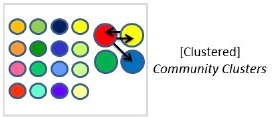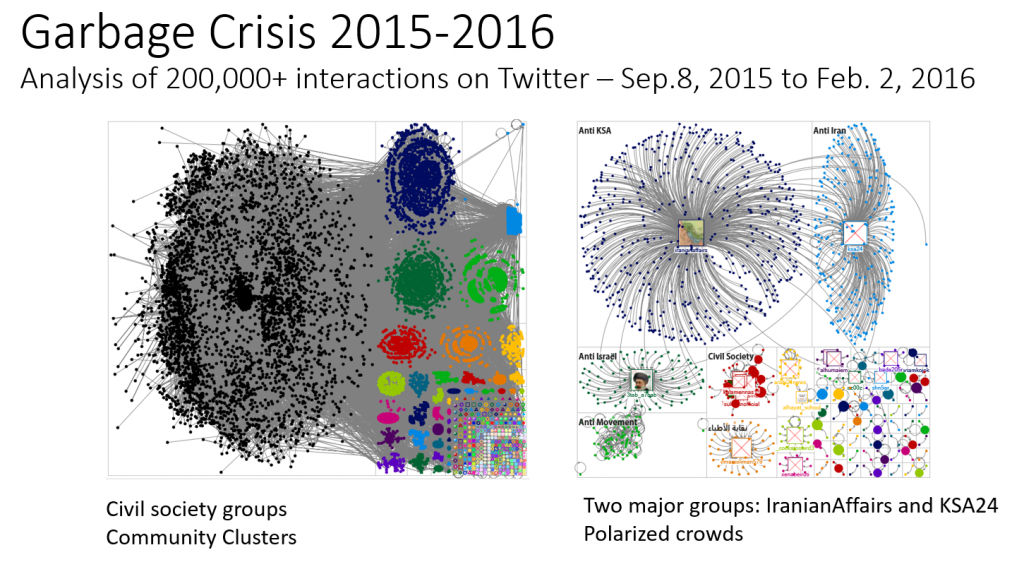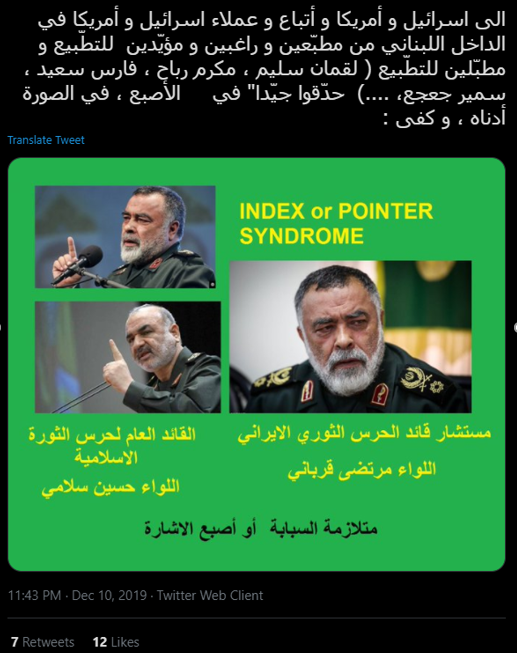My input at the “Who investigates the crime?” webinar of the Forum for Memory and Future in partnership with the Institute of Political Science of the Saint-Joseph University
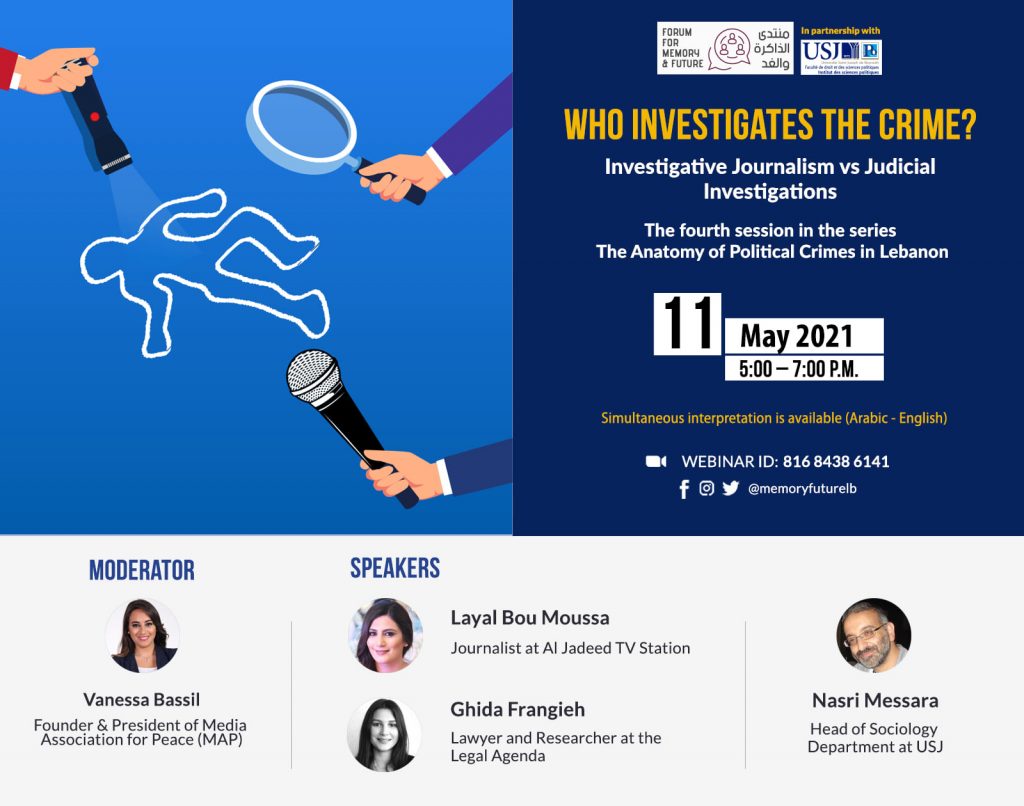
Introduction
The following work is a collection of tweets analysis (more than half a million tweets) that took place between 2015 and 2021.
Discussions take several different shapes that were described in Marc A. Smith’s & al. article. From those different shapes, two shapes mostly characterize political and societal discussions.
Political discussions are often polarized: left wing vs right wing, democrats vs republicans, conservative vs labor party, etc. Despite the hostility that accompany such discussions, political groups rarely communicate with each other and it’s mostly “peers” saying “bad things” about the other party. In such cases, civil society often sets aside and avoid getting stuck “in the middle”:
On the opposite civil society discussions are “community clusters”. People interact extensively in small and medium groups. Each group has its own ideas, projects and solutions to solve the problem at hand. Groups often communicate with each others and are usually driven by emotion, engagement and selfless, disinterested motivation.
The Garbage Crisis: Emotional to Polarized Discussions
In 2015, garbage and trash filled the streets of Lebanon. literally.
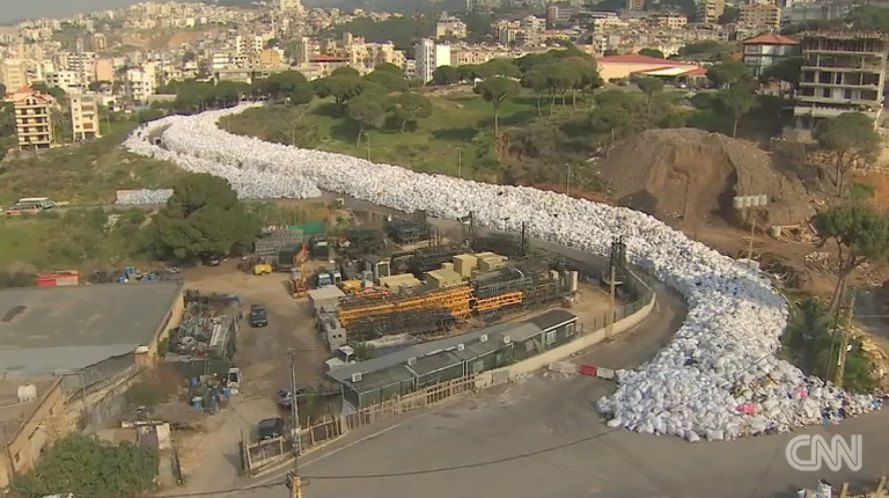
The incompetence, irresponsibility, negligence and corruption of the political elite couldn’t be more obvious and tangible.
People ran to the street demonstrating and asking for a solution. Traditional media supported their actions.
We collected and analyzed more than 200,000 interactions on Twitter using NodeXL between Sep. 8, 2015 when demonstrations were at their peak and Feb. 2, 2016 as demonstrations became sparse, less dense and then completely stopped despite the fact that there was never a real solution to this problem as many regions in Lebanon still suffer from their closeness to huge mountains of trash (Bourj Hammoud, Tripoli, Normandy…).
On Twitter, the discussion started as a community discussion with civil society groups discussing different impacts of the crisis (public health, economy, corruption, diseases…) and suggesting different solutions.
The type of discussion (community clusters) should have never changed to a different structure because the problem is not political and it affects all citizen from all parties indifferently.
However, less than one year later, the discussion, collected through the same hashtags, was completely polarized with groups accusing the civil society activists and group of being affiliated to Iran while others were accusing them of being financed by KSA and the US. In all cases, linking the trash problem to a political conspiracy against Lebanon.
The politicization of the debate ended the contestation movement and people ended up accepting a solution that was way below standards and expectations.
Hariri’s Resignation: Political to Emotional Discussions
On Nov. 4, 2017, Prime Minister Saad Hariri presented his resignation on TV from KSA. The debate was definitely political as the main message in Hariri’s resignation was Hezbollah’s politics and its impact on Lebanon and Lebanese-KSA relations.
We analyzed 10,149 interactions on Twitter on Nov. 4, 5 and 6.
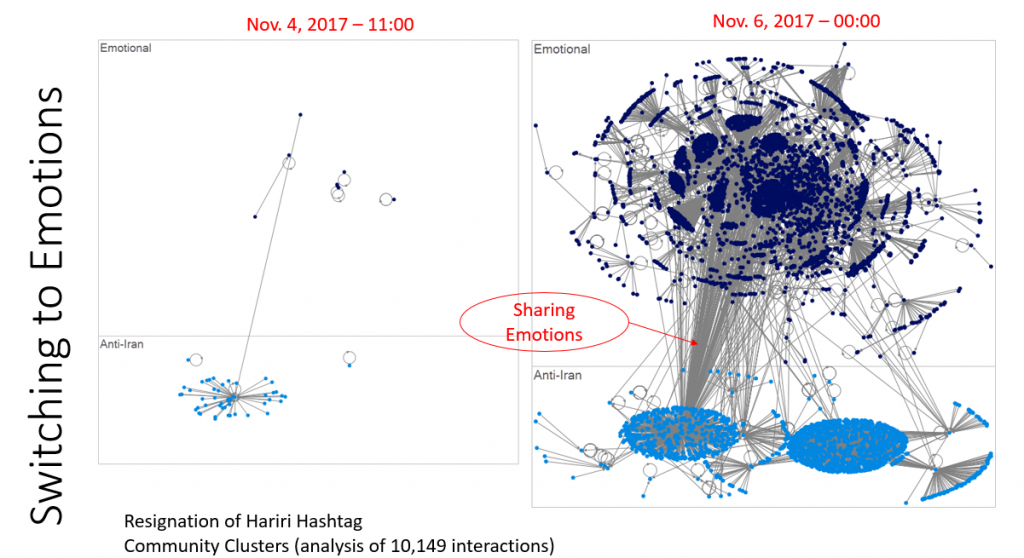
The discussion started as a political discussion with citizen attacking Iran’s (Hezbollah) involvement in Lebanon.
However, after a counter-attack on traditional and digital media, accusing KSA of detaining PM Saad Hariri and forcing him to resign (which has – until the date of publishing this post – not been proven), the discussion was transformed to an emotional one where all groups communicated on “saving” the PM.
During this period, a huge number of memes was released on social media including WhatsApp. Even ones were Hezbollah and pro-Hezbollah leaders acted on saving the PM.

Justice or Populism: The Judge Ghada Aoun’s Case
In recent events, Judge Ghada Aoun, launched an unprecedented action against a witness-company (Mecattaf) in the funds transfers scandal.
Despite the fact that Mecataff was only called as a witness and that it is just an official and legal “courier” in this affair, Judge Aoun raided its offices without the presence of judiciary police while being helped by supporters of the FPM party to break-in and take Mecattaf’s computers in her own car.
Even in a country where political parties have a very strong influence on sectors including judiciary, and even during the 15 years’ civil war, this was – to the extent of my knowledge – the first time that a judge is openly and physically supported and helped by a party’s supporters.
This should have raised real concerns amongst citizen. The issue is not about the rightfulness of Judge Aoun’s actions, however:
- Mecataff is a witness, not a criminal
- Evidence is handled directly by the judge, her drivers and regular citizen, not the judiciary police
- This could happen to “any of us” (having any judge and party’s supporters take justice in their own hands)

To understand how citizen reacted to the event, we collected 20,202 tweets from Apr. 20 to Apr. 25, 2021, using Twitter API.
We categorized 600 tweets manually into:
- Rational Tweets:
- Facts
- Statements leading to further discussion: role of journalists, judicial procedures, etc.
- Political statements
- Emotional Tweets:
- Praising the Judge (Joan of Arc, the Savior, The lady’s version of President Aoun, etc.)
- Tweets related to her hair style
- Jokes
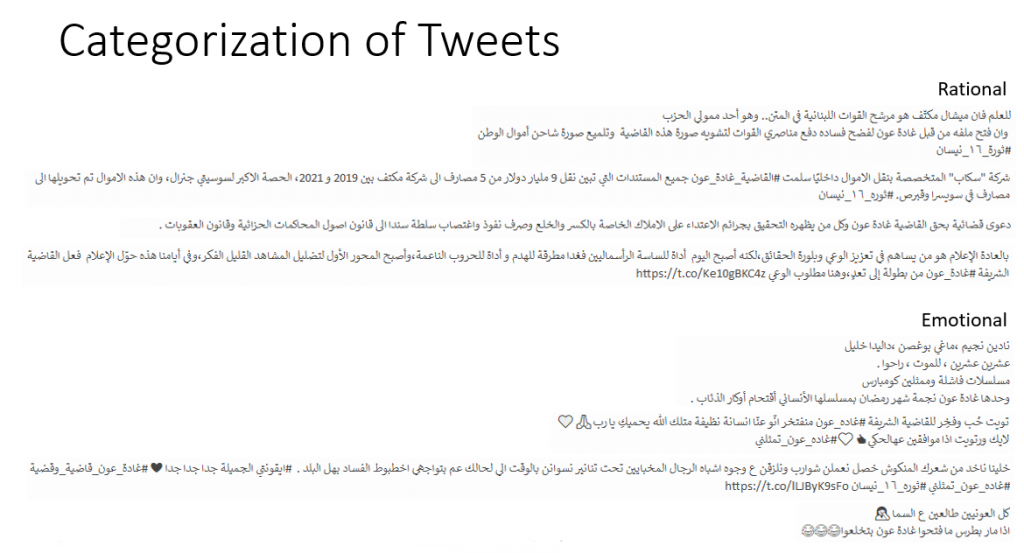
We used the 600 tweets to categorize 19,202 textual tweets using our model for machine learning in Orange.
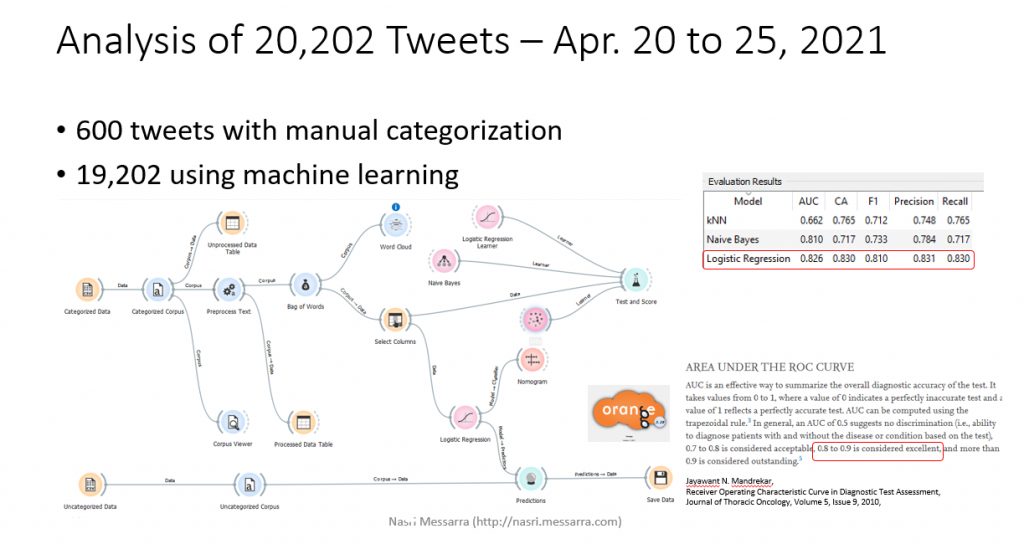
The results showed a strong predominance of emotional tweets over rational tweets with a growing gap as time past from the date of the “raid”:
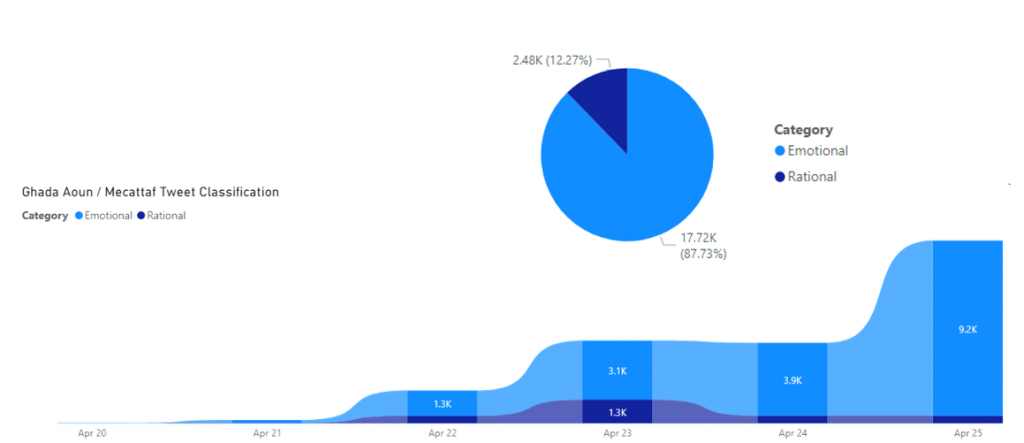
We collected an additional 6,000+ Tweets a week later. While emotional tweets remained predominant, tweeters seemed to lose interest in the Judge’s investigation that did not lead or show any result, and despite a second similar raid on another witness-company (Prosec) on the second week.

Assassination of Journalist Lokman Slim: A Post-Mortem Analysis
Lokman Slim was brutally assassinated on February 4, 2021. He was mostly known for his anti-hezbollah’s positions and his criticism for existing political leaders.
We collected a little more than 180,000 tweets for the period from Jan. 14 to Mar. 14, 2021.
Unfortunately, Lokman Slim was not very active on Twitter. However, following his assassination, local and international NGO, leaders, activists, and “haters” took positions in real life (IRL) and on social media, providing us with thousand of tweets regarding the journalist.
One of the “theories” that emerged, was that Lokman Slim was killed by the Israelis or that he was a supporter for the “normalization” of the relations between Lebanon and Israel.
While this research is still in progress, we felt it would be interesting to investigate the number of tweets talking accusing Lokman Slim of being a collaborator or, on the contrary defending him.
We searched for “Israel” in the collection of tweets and this has shown that starting Jan. 29, many tweets included this keyword, with a peak on the day of this assassination (1,684 tweets from 78,046).
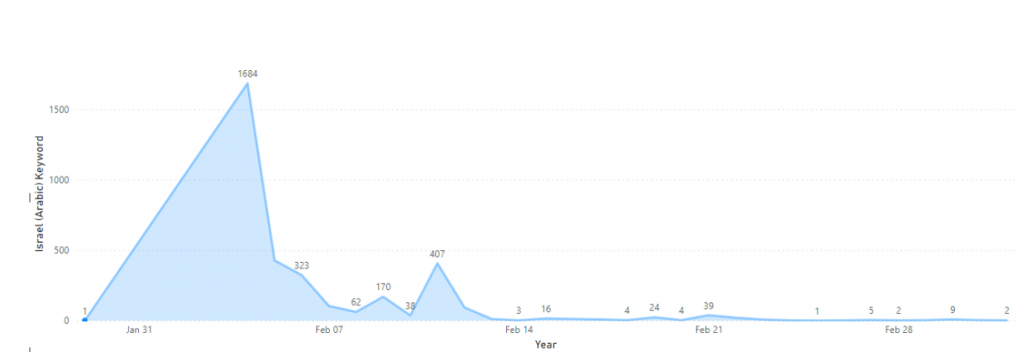
While this analysis will not uncover the real perpetrators or the real reasons behind Lokman Slim’s assassination, this analysis, once finished, should help us understand the impact of “rumors” or “conspiracy theories” in the Lebanese political tweetosphere.

